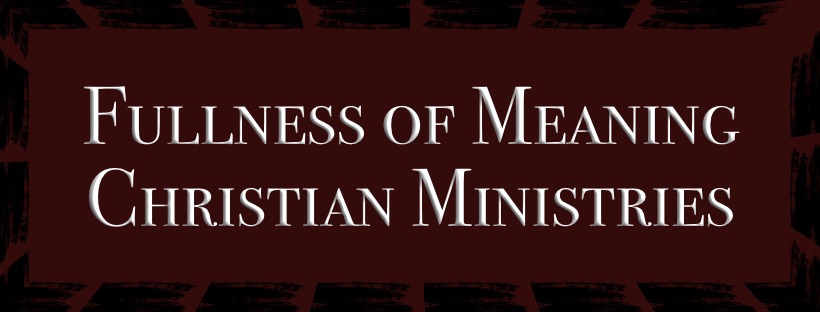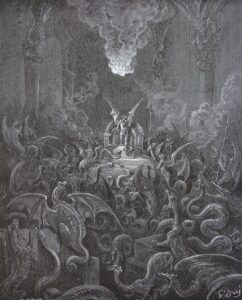The first 2 Declinations of Job
Job as a Righteous Man
Job 1:1-22 -”
1 There was a man in the land of Uz, whose name was Job; and that man was perfect and upright, and one that feared God, and eschewed evil.
“ISH” (NOM.MS.SING.) =A MAN/ “HAYAH” (QAL PERFECT 3RD MASC. SING.)=THERE WAS ( back then, some time ago ) This was a formulaic way in Hebrew to say, “Once upon a time, a long time ago”. This did not give the book of Job over to a fantastic or fictive category, rather, a ‘distancing’ for the sake of its actual antiquity and its tested truths through time.
2. And there were born unto him seven sons and three daughters.
This is a Mesopotamian ratio of Divine blessing as seen in verse 3 where Job has the same ratio of sheep to camels as he does sons to daughters. In a Ugaritic myth, the god Baal had the same divine ratio of children that Job did.
3. His substance also was seven thousand sheep, and three thousand camels, and five hundred yoke of oxen, and five hundred she asses, and a very great household; so that this man was the greatest of all the men of the east.
4. And his sons went and feasted in their houses, every one his day; and sent and called for their three sisters to eat and to drink with them.
At this time, there was a lengthy festival taking place where wandering family members would reside in the houses of each other. This almost gives the air of an astrological statement. That is, each planet to their own housing for a specified meaning and then, a continuance of wandering for other “significant” meanings.
5. And it was so, when the days of their feasting were gone about, that Job sent and sanctified them, and rose up early in the morning, and offered burnt offerings according to the number of them all: for Job said, It may be that my sons have sinned, and cursed God in their hearts. Thus did Job continually.
It is only my opinion but here I think that the possibility of incest was present. The nature of the stay over and the wisdom of Job forced him to urgently perform burnt offering “EARLY” the next morning.
6. Now there was a day when the sons of God came to present themselves before the Lord, and Satan came also among them.
“Beney Ha-Elohiym” – literally: “the sons of the gods”/ “Lahiythyatsav” -literally: “to take one’s stand”/ “al-YHVH” – literally: “against GOD-YHVH” / “Ha-Shatan”. The celestial beings were indeed the sons of the fallen angels. Amongst these Nephilim in their union against Yahweh, stood, “The Satan” – the sifter, the interrogator, the agitant, — cf. “the SHUT” of the Persian Kings. The “Shut” or “Sheitan” were the C.I.A. officers for the Persian Kings. The “Shut” would go out to the markets surrounding the Palace of the King and ask seemingly innocuous questions to anyone in order to find any scandalous thinking against the King and his Kingdom. The Satraps would then take these people into the inner court to be interrogated further, possibly unto death.
7. And the Lord said unto Satan, Whence comest thou? Then Satan answered the Lord, and said, From going to and fro in the earth, and from walking up and down in it.
This question is a literary device used to find out the ‘agency’ of “The Satan”. Mi-Shut in Hebrew literally means, “going to and fro” without direction, as an agitant to ‘stir’. Mi-Shut is the verbal “name” of “Satan”. Hence, the literary mechanism used to verify the “shem” or “authority” by which “the Satan” operates.
8. And the Lord said unto Satan, Hast thou considered my servant Job, that there is none like him in the earth, a perfect and an upright man, one that feareth God, and escheweth evil?
9. Then Satan answered the Lord, and said, Doth Job fear God for nought?
10. Hast not thou made an hedge about him, and about his house, and about all that he hath on every side? thou hast blessed the work of his hands, and his substance is increased in the land.
Very important is the boundary line to the Hebrew mind. The hedge represents the sheep within the shepherd’s gate. Inside the gate is where the legal food can be eaten for the sheep. Outside of the gate represents the heath or the heathen lands. In pagan myths we might find a typology that might be considered here-the monster. The monster always walks around the borderline. The monster is relegated to a specified region. The monster always walked amongst the moors. Without invitation, the monster could never enter into the gate of the victim. Here, we find the request from the monster and the acceptance of the request to come in to Job’s life. nonetheless, Satan is bound to only do that which he does best-sift Job within the bounds of meaning and not unto death.
11. But put forth thine hand now, and touch all that he hath, and he will curse thee to thy face.
This pagan doctrinal approach of “retributive action” will show up later in the pagan doctrines of Job’s ‘friends’. Is this not Partisan politics? Is this not the syncretism of “christianity” and a particular political party? How can we link our beliefs in a Sovereign God who brings all things together with a “partitive” or “partisan” group? I speak against Democrats and Republicans here.
12. And the Lord said unto Satan, Behold, all that he hath is in thy power; only upon himself put not forth thine hand. So Satan went forth from the presence of the Lord.
I must interject that vs. 12 here (the King James Version) is a Horrible translation. God did NOT put Job into the power of God (Romans 13:1 – “All powers that be are ordained of God”). Rather, the Hebrew says, “Bi-Yadeka” – in your HAND (that is: your scope of sifting/ manipulation/ realm/ jurisprudence/ authority)
13. And there was a day when his sons and his daughters were eating and drinking wine in their eldest brother’s house:
14. And there came a messenger unto Job, and said, The oxen were plowing, and the asses feeding beside them:
15. And the Sabeans fell upon them, and took them away; yea, they have slain the servants with the edge of the sword; and I only am escaped alone to tell thee.
16. While he was yet speaking, there came also another, and said, The fire of God is fallen from heaven, and hath burned up the sheep, and the servants, and consumed them; and I only am escaped alone to tell thee.
17. While he was yet speaking, there came also another, and said, The Chaldeans made out three bands, and fell upon the camels, and have carried them away, yea, and slain the servants with the edge of the sword; and I only am escaped alone to tell thee.
18. While he was yet speaking, there came also another, and said, Thy sons and thy daughters were eating and drinking wine in their eldest brother’s house:
19. And, behold, there came a great wind from the wilderness, and smote the four corners of the house, and it fell upon the young men, and they are dead; and I only am escaped alone to tell thee.
20. Then Job arose, and rent his mantle, and shaved his head, and fell down upon the ground, and worshipped,
21. And said, Naked came I out of my mother’s womb, and naked shall I return thither: the Lord gave, and the Lord hath taken away; blessed be the name of the Lord.
This would establish by denotation of the text a belief in God’s Sovereignty.
22. In all this Job sinned not, nor charged God foolishly.
The acts, words, doctrine and profession of Job are given approval by God
Job gave the Calamity to God as God’s act. This was not accounted as sin or foolishness. How many christians would accuse you of error if you said that God causes destruction?
We see the doctrine of Sovereignty professed (word) with worship (deed) under Job’s initial affliction by the ‘hand’ of “The Satan” (Job 1:20). In all of Job’s actions, word and deed, Job did not sin within his circumstance. Furthermore, “circumstance”, was not attributable to Job’s affliction, God was. This would make it personal.
After Job’s initial “Satanic Affliction” (Job 1:13-19), the narration of Job denotes Job’s Theological worldview by word and deed (Job 1:20). Job professed (word) that “Good and Calamity” come from God. Following this profession of doctrine, Job worshipped (deed) God.
The First Declination
What I perceive as the first declination is the lack of ‘deed’ while ‘word’ was kept. We see Job’s Theological worldview denoted in Job 2:10 where Job reiterates his same doctrine found in Job 1:20 (Good and Calamity” come from God – but without the deed (worship or oblation). , word without deed was found in Job 2:10– as Job states: “Shall we accept good (Hebrew: “tov”: “that which is beneficial”) from God and not accept calamity (Hebrew: “ra’ah”: destruction {distinct from ‘evil’ as shown in my previous articles on ‘evil’}) ”? The doctrine of Sovereignty is correct, yet, Job fails to ‘worship’ or prepare ‘oblation’.
This question from Job was a rebuttal to his wife’s statement: ”curse God and die’. Job’s wife’s statement would have had to come from her Theological worldview. This worldview would have been very contemporary with the “allotment” gods/ goddesses of Job’s day.
This common pagan belief would logically reside in her words to Job as to the failure of Job’s God to ‘allot’ Job health, wealth, financial security, a general sense of well being, continuance of his bloodline lost as his children were killed, etc. Her words were exemplary of her deep rooted pagan beliefs: “curse God and die”. This, again, is a ‘denotative’ key to Job’s wife’s worldview. I believe that we see here the belief in “allotment” gods/ goddesses from Job’s wife that were so prevalent in Job’s day (as hidden in our own day through ‘gods’ known by many names).
The second declination found in Job chapter 3
In Job 3:3, we see Job’s wife no more. We see no more of “The Satan”.
Why is this?!? Because they were literary mechanisms to distill the greater Truth through the genius of the Narration of Job. Does this mean that they didn’t exist in history and/or events? – no. What it does mean is that “the STORY” no longer needed them as antagonists to agitate any further meaning out for “the Story’s” sake.
Meaning/ Non-meaning/ sense/ non-sense
The doctrine of Fatalism or Naturalism is found in the first words of Job: ‘damn’ *the Day* (as though ‘the Day’ brought Job’s birth). The worldview of Job’s wife must have been a resonating factor here. Still contrasting natures abide: Job does not curse God unlike his wife who says, “curse God and die”.
“Where” was Job Ideologically here?
I summarize these 10 points as: “LINEAR( Messianic/anabolic)” vs. “CIRCULAR (cosmogonic/ pagan/ nihilistic/cannibalic)”.
Job gave ‘force’ to “The Day” rather than to his Sovereign God. Job could not possibly factor in the reason of God’s Sovereignty while factoring “plight” as “a force” or “condition” by which no other higher order assigned such a plight.
Job’s worldview of fatalism found in chapter 3 was in stark contrast to his Theocentric Worldview in the first two chapters. One cannot hold to both worldviews.
Sheol, or “Hell” is found in Job’s ‘plightful’ or ‘circumstantial’ words of “darkness”, “blindness”, “inability to see (cf. the Greek: “phulake”–’spirits in a dark prison’/ night prison watch)”, “separation”, etc. These “placements” of ‘damnation’ limited judgement but stark positioning of the protagonist, Job.
The CONSISTENCY of denying God’s Sovereignty within the Doctrine of Fatalism, Plight, Circumstance, Naturalism, and Sheol do validate what Sovereignty is NOT.
Job is forced ( in the genius of Job’s Narration) by *Theological Grammar* to abide either in (a) The FREE sense of being BOUND to GOD’s WILL or (b) the LIMITATIONS of being bound to “Plight”, “blindness”, “agony without meaning or sense”.
Job was blinded from the consistency of Theological doctrine found within Sovereignty to use a “LINEAR” direction..that is, Job was found incapable of using a Reason TO Something (namely, a PLAN, an INTENT, a group of “SENSES” to lead on a line of direction/ Job consistently ‘hit the miss’
Job was found using the Consistency of repetition found in the ‘circular’ ideologies of the East and A.N.E. pertaining to that of Naturalism, Fatalism, and Nihilism. One might look to the mythological symbol of the Ouroborus (cycle of cannibalism upon oneself in time only to rebirth and repeat–seen as serpent eating one’s own tail) for a meme concerning this ‘repetition’. This is what I call, “Circular” religion or a “cannibalic” worldview.
It is on the line of LINEAR Theology that one must travel to a final point, namely, the Messiah.
It is one the CIRCULAR Ideology that one must return to unless “nirvana” is achieved. In the name itself, “Nir/ Vana” –’beyond the turmoil of the web of this life’-’to be extinguished from the fire {of this life} -one sees themselves ‘as God’–”THOU ARE THAT” or, in the Sanskrit: “Tat Tvam Asi”. What a scary moment it must be to ‘arrive’ and ‘realize’ that you ‘are it’. That there are no more ‘signals’ or ‘signs’ to follow. That YOU are THAT or, YOU are the ‘end of the road’. You are the “Reference Point”. No more Signs, no more signals, no more senses – the place of “NON-SENSE” is where you abide to make relativistic meaning. What a hell defined!
Job had found a loophole of ‘fatalism’ that was blinded to an attributive ‘non-sense’ . This, “non-sense” means that Job had ‘no signal, no reference, no generator, no generatrix, no deity, no one, no direction, no line, no intention in his ‘world view’ within the context of ‘agony’ for ‘agony’s sake’. One might refer to C.S. Lewis’, “Problem of Pain” for some insight to this topic.
Job was in hell (that is- ‘hidden, away, unseen, “Sheol”) even from the fictional deities or pagan gods of allotments. He cursed no false god, no real God. Job only cursed the plight from which the plight generated (a.k.a. pre-nihilism). Job had taken on a circular form of religion from which no signal began or ended.
Fatalism becomes Job’s myopic worldview. Job attributes “Fatalism” gets the credit of fate of allotments- health and wealth. Job continues to speak of his life in chapter 3 as a type of “plight”. That is, the ‘abandonment’ done by an ‘impersonal force’. This IS the logic led to by ”fatalism” without God as the INTENDER. A repeat of his wife’s denotative ideology, that is: the doctrine of ‘receiving’ — especially: health, wealth, abundance, etc. is considered “good” while calamity is to be cursed, to be thrown into hell < Job’s wife’s words, not mine.
It should be noted that fate is to be distinguished from our marital relationship with God in His Sovereign Intent. “Fate” is more or less a ‘blanket order of naturalistic themes and outcomes. “Fate” is impersonal and finds its closest definition by the Egyptian “netjer” – the allotments by the goddess from the Nile’s life giving/ allotment giving force. The “elan vitale”–the ‘life force’ is yet another close definition. Finally, “nature”, or “naturalism”, — as in Mother Nature and our dependent needs to be allotted from her to us. We find “her” again in the Mesopotamian stories of Tiamat, Inanna, Asherah, Isis, the Ashtoreth, etc.. Interesting, how Job relegates his emotions as ‘doctrine’. Within this “doctrine” he assigns himself under the rules of the “elan-vitale” –or impersonal force. Again, from the original doctrine that Job held, the “elan-vitale”, “nature”, “Fate”, etc,. would be a mere by-product of creation at most/ or a fictitious or fictive force at least.
longer the Deity that Job had all along been giving credit to for everything) that he was born (as though Job had the power to “Damn the Day”). Fatalism, as a doctrine, has taken hold of Job// You can see what Fatalism does to the Theological mind right here)
My question:
Did Job feign to ‘protect God’ by eliminating God in Job’s worldview through the doctrines or professions of ‘fate’ as an impersonal force. Job’s Agony becomes an ‘emotive doctrine’ without intentful causation. Finally, life is shrunk down for Job to the ‘here and now’ and the overview/ the purview of Sovereignty is no longer to be recognized.
I associate myself with this question as I’m sure many Christian believers do when we blame: the church-but do not blame God, the hypocrites in the churches-but do not blame God, the people who act like christians-but do not blame God–all for the sake of “justifying the flesh”—a.k.a.–’getting into sin’ using ‘naturalism, fatalism, doctrine of allotments, etc. as a worldview to sin. How close am I getting?
Finally,
Not to validate this writing with this show: I am reminded of one of my guilty pleasure shows (my wife included) called, “Ghost Adventures”. In this show, the consistent theme throughout every episode is that the ghosts tend to “repeat” throughout the haunt that they abide in. A repetition without end. The hauntings usually include either a gruesome murder, torture, terror, abuse that took place in that particular house or land plot holding these repetition of energies. Simply put, energies that are trapped in replay. No meaning, only suffering. No release, no letting loose—just a cycle of return to the same story. This must be a “hell” if real and for sure, this is what we call hell in this life when we can’t break a destructive cycle. Remember: “CIRCLES vs. LINES” ideology/ Theology.




